'I give Modi full credit for brilliantly using his personal diplomacy, his personal stature, to accomplish his goals.'
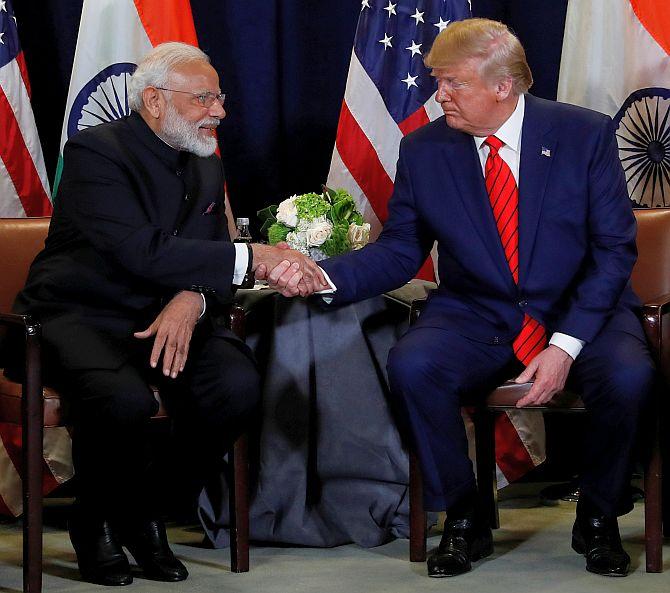
Dr Marshall M Bouton, president emeritus of the Chicago Council of Global Affairs, a global affairs think-tank, and presently acting director and visiting scholar at the University of Pennsylvania's Center for the Advanced Study of India, has devoted much more than half a century of his life to studying India.
"The (India-US) relationship has moved forward. It has had its hiccups here and there, but fundamentally, (External Affairs Minister Subrahmanyam) Jaishankar has always insisted that the relationship is in more than solid shape. He's right about that. At this point in time, the relationship needed a very dramatic demonstration of relationships. And this (the Houston event) was definitely that," Dr Bouton tells Rediff.com's Vaihayasi Pande Daniel in the concluding segment of the two part interview.
Do you think Prime Minister Modi is building a better relationship with Trump? Or is it just two very good actors on a stage?
Two actors on a stage.
Do you think Modi built a better relationship with President Obama?
Well yes. Absolutely.
The attitude in the Obama administration was we just did India a big favour. Now what are they going to do for us?
That was the attitude, I can tell you, among senior officials, with whom I interacted in that first year after Obama came to power, certainly it was for the first seven-eight, nine months. Remember that whole brouhaha how Obama didn't take Modi's call.
Then Obama shifted his position because he recognised that India was important and he needed to accomplish something, which was to get India to sign onto COP (the Conference of the Parties, the topmost decision-making body of the UN climate change convention).
So Obama began to move forward along the same lines that (then US president George W) Bush had and that was to strengthen particularly the security-defence relationship with India.
And it was under Obama that a lot of the key composite was done and so forth, key, very transformative defence agreements.
I think Modi managed Obama. Obama was the one coming from behind in that relationship. That just shows Modi's determination to put this relationship with the US on a more or less even keel for the longer term, which means he has that deep and abiding recognition of the importance of the relationship for the longer term.
Modi, frankly, needs to put much greater substance behind India's assertions of (being) a great power.
The Indian defence budget has not been increased, in real terms, for any of the last three or four years.
India has now the status as the single largest democratic economy. The economy is in serious difficulty now. None of us know whether all the sops being provided now to business will really make a difference in the investment environment.
Many people think that the reforms do not signal a real second wave of reforms that so many people have been calling for for so long.
India needs to show in its economic policies that is determined to achieve a minimum 7% preferably 8% or 9% of growth and sustain it for a couple of decades -- for at least a decade- -and-a-half -- if it's going to, to be able to operate on the world stage as a great power, rather than just playing with statuses of a great power.
We all expected Modi, in 2014, to turn out to be a big-time economic reformer. He just totally disappointed on that score, with the exception of a few things -- the GST, the bankruptcy code, both of which for he deserves a lot of credit. But he hasn't addressed the real hard structural reforms, particularly land and labour reforms.
They are politically difficult. Now will he use his unparalleled power to help to do that?
So all of that segues to the further point here that that Modi won this election, clearly in part, because of many Indians who saw him asserting India's claim to great power status.
They saw him, they transferred onto him, their own aspirations for India to be a respected power in the world.
They transferred onto him their own wishes for better lives for themselves in 2014. Now it's become, you know, a wider aspiration.
He has got to deliver on the changes in India's economy and society that are going to make that possible, truly possible.
So that's why I say that it's positive for both men. More so for Modi.
Modi is the greater gainer in all this, I believe.
A gainer in perception, more than anything else?
Yes. Maybe, maybe Wilbur Ross (US secretary of commerce) will lay off, in the next 16 months on the trade issue. Maybe it gives the bureaucrats in Washington, on the defence- security side, you know, greater confidence in their judgements about how to move forward on a variety of security agreements. Minor stuff.
The whole symbolism of Trump joining Modi on stage in Houston was a clear message to Pakistan. But Trump is mercurial and can just as quickly change his stand.
In the next moment he may not necessarily do all the right things by India, especially when he deals in future with Imran Khan?
Yeah. So if you think Trump is a constant friend, think again (laughs)!
That said, look, the remarkable thing is that, basically, (apart from) a couple of silly, stupid, whatever, comments, statements here and there by Trump, which we all expect practically on a daily basis, he's been constant on the issue of India.
Remember, the Indian-American gathering in northern New Jersey (in October 2016), where he got up on stage and said, 'I love Hindus', preceded by the skit of young people who were pretending they were Indian women who were going to be attacked by jihadis and the Indian soldiers came in to save them.
That was the skit that preceded Trump's appearance on stage there...
But he has been, before this event, of late re-hyphenating India with Pakistan. So that doesn't necessarily bode well, in spite of them sharing all this love and affection in Houston?
What in practice did you see after Pulwama? Did you see the Trump administration re-hyphenating?
No. it is just talk.
Just talk. That's, that's the essence of Donald Trump. Right?
It's just the way he operates. He's impulsive, he's is in the moment. He is a brilliant marketer, nonetheless. And he saw this as a brilliant marketing opportunity.
On the domestic front, back home, people may have reasons to be unhappy with Modi. But when he goes abroad, he is the Indian prime minister. And from where I'm sitting, he looks like he pulls off quite a good show when he goes abroad. But that's from where I'm sitting.
What does it look like from where you're sitting?
I give Modi full credit, for brilliantly using his personal diplomacy, his personal stature, to accomplish his goals...
He is a master of this kind of political theatre.
I'm not saying that disparagingly. It is just a reality. Actually, a very effective reality.
All great politicians are masters of political theatre. So I can see how it resonates back home in a very positive way. You can't take away from that.
How do Americans look at a leader like this?
For those who are paying attention, you know, the Chicago Council Poll (run by the Chicago Council of Global Affairs) which I ran for 12 years have this so-called thermometer where they measure countries. Tell us how you feel about this country. Warm or cold?
We go through a whole list of countries, and I haven't seen the most recent ranking, but India has come steadily up. It used to be down in the 30s. Last I saw it was over 50. And this is when you know, Canada and the UK get a 70 rating. So remember the scales are on 100.
So, India has, partly because of the accomplishments and reputation of Indian Americans, sort of model minority status along with other Asian Americans, partly because of what's happened in the official relationship over the years, partly because it's become politically popular to be associated with India for all kinds of politicians. Fastest growing economy for three or four years. Lots of things. So certainly, it helps in that, there's no question about it.
How do you rate the Houston event on a scale of one to 10. And its possible outcome?
In terms of immediate political ascent? It is 8 or 9 or 10, Somewhere up there.
In terms of lasting impact? It is not clear what will come of all that. But some of it has, especially on the security front.
The relationship has moved forward. It has had its hiccups here and there, but fundamentally, (External Affairs Minister Subrahmanyam) Jaishankar has always insisted that the relationship is in more than solid shape. He's right about that.
At this point in time, the relationship needed a very dramatic demonstration of relationships.
And this (the Houston event) was definitely that.
So it almost happened to script? This is what needed to happen and it did, a huge credit to whoever pulled it off.
I have to conclude it was Jaishankar. It was a brilliant Jaishankar (move). I don't know that for a fact, but I am willing to guess that Jaishankar, when he got here got to speak to (US Secretary of State Mike) Pompeo, or maybe there was a communication before that, however, but that (communication would have been) what if (laughs) the president joined Modi (on the stage in Houston)!
It probably happened some other way, but I wouldn't put it past him (Jaishankar).
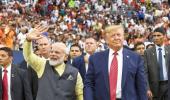
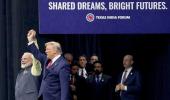
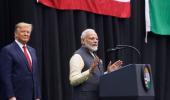
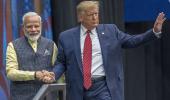
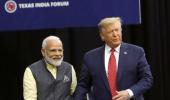






 © 2025
© 2025